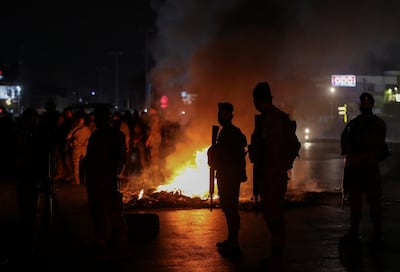In late May, the commander of the Lebanese Army, Joseph Aoun, was received in Paris by the French president Emmanuel Macron. The singular nature of the meeting – presidents don’t normally receive army chiefs from small countries – underlined the importance that France gives to Lebanon’s armed forces as an agent of stability at a time when Lebanon is collapsing economically and socially.
There appears to be a consensus among foreign governments that the army must not be allowed to fragment because of the Lebanese state’s bankruptcy. Indeed, an international conference has been scheduled in Paris for June 17 to support the institution. Soldiers’ salaries are now worth almost nothing because the Lebanese pound has lost around 93 per cent of its value. Last March, Gen Aoun made a much remarked address in which he stated: “The people are hungry, the people are poor and the members of the military are also suffering and are hungry”.
In that same speech, the commander publicly asked the political class, which has remained unable to form a government: “Where are we going? What are you waiting for? What do you plan to do? We have warned more than once of the danger of the situation.” Those remarks highlighted another side of Gen Aoun, that of the socially responsible official, an image the commander doubtless sought to project, given that he remains a prime candidate for Lebanon’s presidency.
The consensus in foreign embassies in Beirut, particularly that of the US, is that bolstering the army is a priority, as it remains the sole multi-sectarian national institution that continues to function relatively efficiently. If the army were to disintegrate, the thinking goes, this could not only have a devastating impact on security and stability, but on the very idea of reconstituting a cohesive state. If the economic catastrophe worsens, partisan groups could begin to protect their own areas of concentration and, conceivably, even form proto-militias to do so.
The US is a major backer of the Lebanese army, though there is a part of the right-wing firmament in Washington that would like to end all American funding to the institution. In June 2020, the congressional Republican Study Committee (RSC), a conservative caucus in the House of Representatives, recommended just that. In a report released at the time, the RSC had affirmed that as the army had not acted against Hezbollah, Washington should discontinue security assistance.
It is possible that the report’s section on Lebanon was written by employees of right-wing Washington think tanks that have influence over Middle East policy. The problem is that nowhere in the document was there any serious assessment of what might happen if funding were stopped, or if another one of the RSC proposals was implemented – that the US should pass legislation prohibiting any taxpayer money to the International Monetary Fund from going to a bailout of Lebanon.
However, from the perspective of the foreign embassies, the answers are all too clear. There is a strong consensus that Lebanon’s breakdown would only benefit Hezbollah, which alone has the means to weather the crisis that the country is facing today. The party would welcome a weakening of the army, which it has always considered a potential rival, even if it does have influence in the institution.
Hezbollah also realises that for as long as the army remains a potent institution, the party’s legitimacy as a “national resistance” will be questioned. Many Lebanese insist the armed forces, not the party, should be the sole defender of the country. Even during the civil war, the army remained popular as a remnant of the absent state that was against militia rule, to the extent that Lebanon’s former army commander and current president, Michel Aoun, first built his reputation on this yearning.
For those who argue, simplistically, that the army’s bona fides can only be proven if it opposes Hezbollah, what they are asking for is that the institution risk civil war and rifts within its own ranks to merit outside support. Yet the army is a mirror of Lebanese society, with its sundry sectarian loyalties and tendency to accept compromises to avert dangerous outcomes. Pushing it to take actions that only heighten its contradictions would be irresponsible.
But the armed forces’ effectiveness and broad appeal is not in doubt. As Dana Stroul, the US deputy assistant secretary of defence for the Middle East, recently remarked following a joint exercise between American and Lebanese forces, Washington is “interested in developing a long-term partnership with a national representative institution to provide an alternative to Lebanese Hezbollah.”
Such language irritates the American hardliners, because they argue that far from providing an alternative to Hezbollah, the army colludes with it. Certainly, it has co-ordinated with the party on issues, which is inevitable in a multi-sectarian country like Lebanon. However, what the critics refuse to grasp is that for as long as the army remains in place, it will indeed be seen as a far more consensual alternative to Hezbollah, albeit one the pro-Iranian party will do its best to neutralise.
For now, those demanding a cessation of aid to the Lebanese army are on the sidelines. Those with knowledge of Lebanon know that accelerating the armed forces’ demise would be folly when Lebanon may be entering a ruinous vacuum that could have regional repercussions, and would only reinforce Hezbollah. Western governments still trust their embassies over ideologically driven think tankers.
Michael Young is a Lebanon columnist for The National



